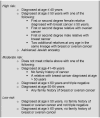Are physician recommendations for BRCA1/2 testing in patients with breast cancer appropriate? A population-based study
- PMID: 23861169
- PMCID: PMC3795950
- DOI: 10.1002/cncr.28268
Are physician recommendations for BRCA1/2 testing in patients with breast cancer appropriate? A population-based study
Abstract
Background: To the best of the authors' knowledge, few population-based studies to date have examined the use of BRCA1/2 testing or patterns of physician recommendations for genetic testing among women diagnosed with breast cancer. The objective of the current study was to evaluate the rates and predictors of physician recommendation for BRCA1/2 testing among patients with breast cancer.
Methods: Women aged 18 years to 64 years who were diagnosed with invasive breast cancer in 2007 were identified from the Pennsylvania Cancer Registry and mailed a survey regarding their family history of cancer, physician treatment recommendations, and BRCA1/2 testing. Of the 4009 women who were sent surveys, 2258 responded (56%). Based on age at diagnosis and family history, women were categorized as being at high, moderate, or low risk of BRCA1/2 mutations.
Results: Nearly 25% of the participants were classified as being at high risk of carrying a BRCA1/2 mutation based on their age at the time of breast cancer diagnosis and family history of breast and/or ovarian cancer. Physician recommendations for BRCA1/2 testing were found to be strongly associated with risk of carrying a mutation, with 53% of high-risk women reporting a testing recommendation compared with 9% of low-risk women. In addition, physician recommendations were strongly correlated with the use of testing in all risk groups. Among high-risk women, the lack of a recommendation for BRCA1/2 testing was more common among older, low-income, and employed women.
Conclusions: Although BRCA1/2 testing recommendations appear to be appropriately correlated with mutation risk, a significant percentage of patients with breast cancer who meet criteria for BRCA1/2 testing may not receive a recommendation for such testing from their health care providers.
Keywords: BRCA1/2; breast cancer; cancer registry; genetic testing; physician recommendations.
Copyright © 2013 American Cancer Society.
Conflict of interest statement
The authors have no conflicts of interest to disclose.
Figures
References
-
- Rebbeck TR, Friebel T, Lynch HT, et al. Bilateral prophylactic mastectomy reduces breast cancer risk in BRCA1 and BRCA2 mutation carriers: the PROSE Study Group. Journal of clinical oncology: official journal of the American Society of Clinical Oncology. 2004;22:1055–1062. - PubMed
-
- Frank TS, Deffenbaugh AM, Reid JE, et al. Clinical characteristics of individuals with germline mutations in BRCA1 and BRCA2: analysis of 10,000 individuals. Journal of clinical oncology: official journal of the American Society of Clinical Oncology. 2002;20:1480–1490. - PubMed
Publication types
MeSH terms
Substances
Grants and funding
LinkOut - more resources
Full Text Sources
Other Literature Sources
Medical
Miscellaneous


